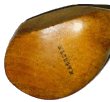
|
Registration Edit profile catalogue auction shopping cart shipping history makers search faq news links about contact |

Clubmakers
St Andrew Golf Company
Glasgow / Dunfermline
The firm’s clubs bear the cleekmark of a stag (early adopters of the acronym) in various positions. Firstly, let’s dispel two myths about the company.
It has nothing to do with St Andrews: it is named for St Andrew, the patron saint of Scotland. Secondly, various websites have associated it ‘by research’ (i.e. they copied someone else’s misinformation) with Ogg-mented irons which is nonsense. Willie Ogg never worked for the company. He served his apprenticeship with James Gourlay at home in Carnoustie then moved to Hendry & Bishop in Edinburgh where he rose to be a manager and they sent him to America. His development of the forerunner of perimeter-weighted irons was in association with a local dentist at the Worcester Country Club and they had Wilson of Chicago make them from 1933 onwards. STAG made them in the UK as they did other Wilson clubs under licence in the 1930s.
It was founded around 1905 in Avenue Street, Bridgeton, in Glasgow. In 1910 it patented the Grypta grip, a rubber-leather combination, supposed to be kinder to the hands.
Some time before 1916 the firm was bought by Clent Hirst (because it was in that year through Bruce, Hunter and Hirst, he, using the Bridgeton address, acquired the club and ballmaking business of the late Tom Morris in St Andrews). Hirst was originally from the Midlands of England and had initially set up a company in Glasgow making leather goods including golf bags.
The company received a well-deserved panning in the John Bull Sunday newspaper in March 1915. It had announced that a voucher included with the Scottish King golf ball could be sent to the Prince of Wales National Relief Fund and it, on sending it to the St Andrew Golf Company, would be paid 5 shillings. As the newspaper pointed out, the Scottish King was not a well-known brand so this was just a cheap advertising tactic and, had the company wanted to make a donation to the fund it could have been achieved without the complication of involving both the fund and the retail purchaser. The Truth newspaper called the scheme ‘open to objection’. Was there really an era of an ethical press? Probably not but the practice is, of course, now ubiquitous and no newspaper, dependent on advertising, would emit a squeak against a potential advertiser.
Despite the name they must have sold other sporting goods as in 1921 they were successfully sued by a football manufacturer in Belfast who claimed he had not been paid and the golf company’s defence that the balls were defective was rejected by the jury.
In 1923 the company succeeded in producing the first ever fully machine-made wooden driver, or rather its head, the machined shaft was added to the club the following year. It still exists and was sold at auction in 2009. The firm continued its presence in Glasgow with a showroom, and added one in Edinburgh, but production moved to the Headwell Works in Dunfermline in 1926. It had an international clientele, producing clubs for Hollywood stars such as Douglas Fairbanks and also several sets for the King of Siam (Thailand). From about 1928 it was also the British arm of the Nieblo Manufacturing Company who produced William Lowell’s invention of the Reddy tee, made first from birch then, from 1928, also from celluloid.
Clent Hirst died at his home in Dunfermline on Boxing Day 1934 after placing the assets of the St Andrew Golf Co and his share of the Tom Morris business in a trust. The managers of the company attempted unsuccessfully to buy the company from this family trust but ultimately succeeded after the Second World War when production had been switched to the war effort and the firm struggled to recover in peacetime. The upper storey of their Dunfermline factory was gutted by fire in July 1947 with 5000 golf clubs lost but the company continued making golf clubs until, at least, the late 1970s.
There are many model and series names associated with them from the hickory era, including Bobby, Choix, Jupiter, Kiddy, Standard, Super Stag, Suxes.
![]() Search the catalogue for
clubs by this maker
Search the catalogue for
clubs by this maker
site design dmc ltd | © 2000-2024 Antique Golf Clubs from Scotland